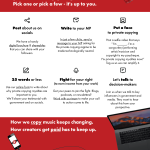

Part VIII of the Copyright Act has not been updated since 1997 when blank audio cassettes were the medium of choice for copying music. Currently the private copying levy only applies to blank audio recording media, like CD-Rs. The Act does not reflect that today smartphones and tablets are the new standard for copying music. As a result, rights holders do not receive compensation for the majority of the copies made of their music. Music rights holders need to be fairly compensated for those copies. Copies have value, if they didn’t have value people wouldn’t make them.
Since 2003, over $280 million has been paid to music rights holders for private copies made of their music. But the amount available for distribution to rights holders is rapidly decreasing, because, today, the private copying levy only applies to CD-Rs. With the declining use of CD-Rs to copy music, revenue from the private copying levy will soon be obsolete.
The amount available for distribution to rights holders from the private copying levy has dropped from $27.6 million in 2008 to $2.4 million in 2016 – a 92% reduction. This downward trend is expected to continue. Without the changes to the Act the funds distributed annually to music rights holders through the private copying levy will disappear, and many songwriters and artists won’t be able to afford to continue to create music at at all.


